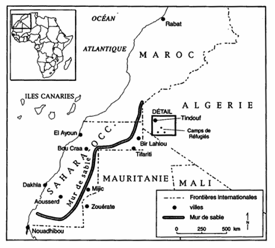A few historical tags about Western Sahara
Western Sahara is as large as United Kingdom, situated between Morocco, Mauritany and Algeria. It is one of the most inhospitable regions of the world. Winds blow continually. Temperature can reach 55° C in summer and be as low as -5°C in winter. Only a few years ago, lots of nomads were still living in those harsh areas. Today, this territory is an empty space, without life, but the site of an endless war of attrition between the Polisario Front (Popular Front for the Liberation of Saguia el-Hamra and Rio de Oro) and the Moroccan army, since Spain withdrew her troops in 1975 without real willing to decolonize the country.
The claims of this silent conflict are the right to autodetermination and independence for the Sahrawi people, and the right to annex Western Sahara to their country in the name of historical and secular links for the Moroccans. Exploitation of phosphates and petrol fields offshore are other obvious economical stakes.
 From North to South, this territory is now crossed by a sand wall of 2500 km, built by the Moroccan army. High from several meters, it shelters an underground sophisticated system of batteries and radar screens. Any movement is detected in a field of 60 km. On a strip of 400 meters along the wall, barbed wires and mines make impossible any attempt to approach the edifice.
From North to South, this territory is now crossed by a sand wall of 2500 km, built by the Moroccan army. High from several meters, it shelters an underground sophisticated system of batteries and radar screens. Any movement is detected in a field of 60 km. On a strip of 400 meters along the wall, barbed wires and mines make impossible any attempt to approach the edifice.
Staffed by thousands of Moroccan soldiers, this wall changed, as soon as it was built in 1989, a war of ambush into a war of attrition. Like the Barley line built by Israeli in Eastern Sinaï, it makes impossible any incursion of the POLISARIO Front in most part of Western Sahara.
On both sides, two types of Sahara are in conflict. At the West, the useful Sahara is occupied by the Moroccan army, by hundred thousands of settlers coming from the North, and by Moroccan, Spanish and foreign industries that exploit natural economical ressources (phosphates at Bou Craa, fishing in Dakhla and Laâyoune, petrol off-shore). At the East, the free Sahara, the Sahrawi Arab Democratic Republic (SADR), is a partially recognized state (mainly by a few African countries) that was proclaimed by the POLISARIO in1976. The symbolic capital is Bir Lahlou, a Sahrawi village where a few buildings are used as Parlement, Ministeries and offices. The other free cities (Mijek, Tifariti, Zoug) are occupied by soldiers of the POLISARIO, as the rest of Western Sahara on the eastern side of the wall.
Beyond the free Sahara, in Algeria, about 160000 Sahrawi people have been living in exile since 1976, when napalm bombings by the Moroccan army forced the inhabitants of Sahara to run away. They live in camps of refugees, on the hamada of Tindouf, a remote region of Algeria. There is no asphalted road. Only planes flying from Alger can land. Life is extremely difficult and precarious. Survival is only possible thanks to the help of Algeria and non-governmental organizations.
As large as a French department, the camps of refugees of Tindouf tend to reproduce accurately, by the wish of their inhabitants and the POLISARIO, the geography of their lost land. Four provincies have been constituted, each one being composed of about ten camps and bearing the name of an occupied town : Laâyoune, Smara, Dakhla, Aoussert. In this territory of exile, on the Algerian ground, daily life has got itself organized. Schools have been built, as well as health centers, hospitals and military camps of the POLISARIO front.
In several places, on both sides of the wall, troops of MINURSO (Mission des Nations Unies pour le Référendum au Sahara Occidental) are present. Their mission is to prevent war to become effective and to set up a consultation of populations about having their country being incorporated or not into Morocco. MINURSO has been in Western Sahara since 1991. However, fifteen years later, this referendum has not yet happened.
Meanwhile, on the front line, on both sides of the wall, thousands of soldiers, of the Moroccan army or the POLISARIO front, are waiting. They are waiting for orders. They are waiting for the mistake, the faux pas, of the others on the other side. They are in a state of war, permanently under alert. Though they have not fought since 1991, they know or think that war may break out at any time and, in the opacity of sand winds, they look at the horizon peering into what they might never approach.
Pierre-Yves Vandeweerd
